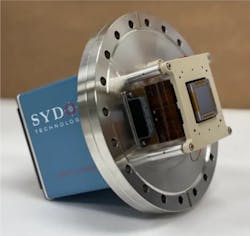NASA awards Sydor Technologies $150K Phase 1 SBIR grant for Class-D space mission x-ray detection technology for astrophysics
ROCHESTER, N.Y., [Aug 17, 2022] ‒ Sydor Technologies is a global leader in advanced x-ray detectors and diagnostic instrumentation design and manufacturing. This summer, Sydor has been awarded a Phase I Small Business Innovation Research (SBIR) grant by NASA, valued at US $149,993. Through this SBIR, Sydor and collaborators at the MIT Kavli Institute for Astrophysics and Space Research will begin developing a low cost, versatile soft x-ray detector for class-D space missions based on Sydor’s new commercial soft x-ray detector, the high-resolution Wraith sCMOS. Leveraging a proven, off-the-shelf detector for future class-D space missions will decrease the detector unit cost per mission and introduce a new era of mission flexibility to the Astronomy and Astrophysics communities.
This Phase I award will result in a detailed assessment of the existing commercial Sydor sCMOS detector for space flight readiness. In the x-ray test facilities at Sydor and MIT, the existing sensor and camera electronics will be evaluated for radiation hardness, vibration resistance, power management, and other factors to satisfy the demanding environments of astrophysics and space research. After the preliminary assessment, development will start on preliminary prototype design package that includes mechanical, electrical, and software systems design to demonstrate how the existing technology will interface with new application platforms like sounding rockets and satellites.
The study will also assess the potential market beyond space missions, including challenging x-ray measurements at university and government labs that support NASA objectives. This includes facilities studying absorption spectroscopy and high-resolution imaging applications with bench-top soft x-ray sources and at synchrotrons that will benefit from a commercial vacuum-rated and cost effective detector. The synergy between faster and lower cost sensor advancement for the non-NASA facilities will feed into the designs in this program, reinforcing faster functional improvements benefitting all users of the technology.
Sydor Technologies’ leading x-ray technology expert Dr. Ben Martin said, “This is a wonderful opportunity to broaden the fields of study that can benefit from our x-ray detectors beyond light sources and fusion science, and to forge a new collaborative partnership with the team at MIT.”
A lower cost, space capable sCMOS imager will offer scientists observing quasar jets, gravitational lenses, and supernova remnants access to the most recent advancements in detection technology in a more flexible and affordable space-qualified design. Through qualification testing and developing a new space rated package design for Sydor’s soft x-ray imager, Sydor Technologies and the team at MIT will help the astronomy and astrophysics communities improve imaging resolution of future space based observatories beyond the 0.5 arcsec of the highly successful Chandra X-Ray Observatory. This will enable new discoveries in imaging and physics beyond Earth’s atmosphere.
About Sydor Technologies
Sydor Technologies is a global leader in providing complex measurement solutions that generate critical results for the world’s most advanced applications in the defense, energy, ballistics, security, space, and research industries. Established in 2004, Sydor Technologies is headquartered in Rochester, NY and now supplies systems and support in over 33 countries. For additional information, please visit www.SydorTechnologies.com
